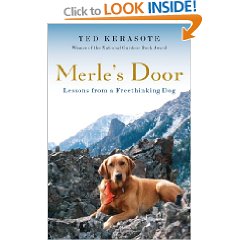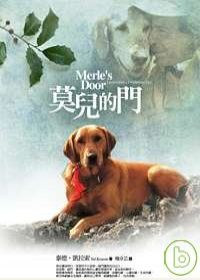莫兒的門
Merle's Door: Lessons from a Freethinking Dog
『這本書講的是一隻狗的故事,我的狗莫兒,但也是世界上千千萬萬隻狗的故事。莫兒讓我明白,重要的不只是裝一扇門讓狗自由出入,而是開一扇門,讓我通往牠的心靈和情感的世界,成為苟的夥伴。牠教導我態度,最重要的態度是鬆開鎖鏈,身體的鎖,心靈的鎖,生命的鎖,終至將鎖鍊完全拋開,讓狗自己學習,跟隨牠的鼻子,自由奔跑。』by Ted Kerasote
感言:
家中也養著一隻黃金,讀著書感覺就像會是我家阿金的該有的一生。雖然替作者感傷他在莫兒去世後的失落,但心中也艷羨這樣的主人可以提供他家狗兒這樣的生長環境,這樣的狗與主人惺惺相惜,這樣的彼此的信任,這是養狗人最高的境界了。
甫出版即登上亞馬遜網路書店、《紐約時報》、《丹佛郵報》、《今日美國報》和美國獨立書商協會的暢銷書排行榜,並蟬連《紐約時報》排行榜二十多週,多倫多《環球郵報》年度百大好書,亞馬遜網路書店寵物類書籍第一名、讀者五顆星感動推薦。
金黃色大狗突然從黑夜中冒出,深棕色的眼睛閃著洞悉一切的光芒,彷彿在說:「你需要一隻狗,就是我。」 有著獵犬血統的牠只愛追麋鹿和野牛,而對撿拾小球和樹枝不屑一顧;花大錢幫牠蓋了名為「麗池大飯店」的豪華狗屋,偏偏牠只愛住家裡,學習從專屬的狗門自由進出;牠每天都到鎮上巡視一週,是街坊鄰居無人不曉的「鎮長」;牠是狗兒們的老大、惡狗的剋星,也是人類最好的朋友。 牠是莫兒,一隻來自荒野、擁有鮮明個性、充滿智慧與熱情的狗。作者凱拉索為莫兒開了一扇狗門,讓牠自由自在探索這個世界;這扇門也讓作者進入莫兒的內心世界,感受牠的忠誠、恐懼與喜悅,於是一個人與一隻狗建立起充滿愛與友誼、平等與互重的關係,使莫兒成為一隻獨立自主的狗,而不是卑微順從的寵物。愛狗的讀者必能從中找到類似的經驗,莫兒的故事也促使每個人重新思考自己與狗狗的關係。 《莫兒的門》記錄他們相依為命十三年的感人故事,對於人狗關係有溫柔而深刻的描寫。作者以充滿詩意的文字描寫莫兒多采多姿的生活,細膩敏銳的筆觸時而幽默、時而令人悲痛心碎。讀過此書你將永生難忘。
作者簡介
泰德.凱拉索(Ted Kerasote) 是美國當代重要的自然作家,曾為《國家地理旅遊雜誌》、《紐約時報》、《沙龍》雜誌、《奧杜邦》(Audubon)期刊等五十種知名刊物撰稿,並著有六本書,其中《Out There: In the Wild in a Wired Age》是2004年美國國家戶外書籍獎自然與環境類得獎作品。凱拉索出生於紐約郊區,目前住在懷俄明州,靠打獵取得食物,經常出外健行、爬山和探險,豐富的戶外經歷為他提供了豐沛的寫作素材。
★泰德.凱拉索個人網站:www.kerasote.com
譯者簡介
穆卓芸 文字手工業者,譯有《神秘的推拿師》、《尋找松露的人》、《愛情的謎底》、《試驗年代》、《我是大衛》和《藍眼菊兒》等書,現旅居歐陸。 |
名人推薦
top
媒體推薦
◆有史以來最傑出的狗狗書……文筆優美,流暢易讀,幽默而令人時時稱奇,更是真摯感人。讀過此書你將永生難忘。--湯瑪斯(Elizabeth Marshall Thomas),《狗兒的秘密生活》作者
◆《莫兒的門》是通往狗狗心靈的一扇窗,你可以從中感受到牠的忠誠、恐懼、喜悅和牠真正的內心世界。只要是愛狗人士就一定要讀這本書。--葛蘭汀(Temple Grandin),《傾聽動物心語》作者
◆時而幽默、歡喜,時而觸動人心……作者對莫兒有著強烈的愛、對野外生活充滿熱情,這本書必將贏得眾多讀者的心。--《出版者週刊》
◆這是一本充滿研究精神、哲理、感性甚至令人心碎的書……莫兒過世時,作者悲傷過度難以自持,而整本書的結尾簡直像藝術品般充滿美感。無論你愛不愛狗,這本書的最後幾句話肯定讓你極度動容。--《環球郵報》
◆在這本回憶錄兼訓練手記中,作者以充滿詩意的文字描寫他的狗狗莫兒,而讀者若想與狗狗的關係更加深刻,本書也提供許多訣竅。--《時人》雜誌夏日閱讀
◆作者讓每位讀者更深一層思考自己與寵物的關係。強力推薦這本書,也請多準備一些衛生紙。--《圖書館期刊》
◆作者講述莫兒的故事時,同時探討了犬科動物的行為與演化、穿插描述人狗關係的研究,並深入思考狗狗眼中的世界。莫兒是如假包換的一隻狗,同時牠也代表了世界上的每一隻狗。這絕對是一本珍貴無比的書。--《書單》雜誌
◆這本書對於動物的聰明才智與人狗關係有著既溫柔又深刻的關注。--《柯克斯書評》
Editorial Reviews
From Publishers Weekly
Humorous, jubilant and touching by turns, this story of the relationship between man and dog is informed by the author's grasp of animal research and his attachment to Merle, a stray dog he adopted. A Labrador mix, Merle first appeared while the author was on a camping trip. Kerasote (Out There: In the Wild in a Wired Age), an award-winning nature writer, decided to take his canine friend home to rural Wyoming. This chronicle of their 13 years together is interspersed with studies by animal behaviorists that strengthened Kerasote's desire to see Merle as a responsible individual rather than a submissive pet. Merle set his own eating schedule (though not without early mishap), refused to hunt birds (although not elks) and, according to the author, possessed a range of emotions and sentiments similar to those of humans. Kerasote tends to anthropomorphize Merle's every look and movement, but this narrative is entertaining and Kerasote's strong love for Merle and enthusiasm for life in the wild will win over many readers. Kerasote's joyous relationship with Merle is balanced by a bittersweet account of a close relationship the author had with Alison, a neighbor and fellow dog owner. Kerasote's last weeks with the dying Merle are beautifully rendered.
Interview with Ted Kerasote, author of Merle's Door
Q: Merle’s Door: Lessons from a Freethinking Dog distinguishes itself from the rest of the pack of dog memoirs by offering readers fascinating facts about canine genealogy and the evolution of human-dog interaction. How long did it take you to research the book?
A:One of my aims in writing Merle’s Door was not only to tell the story of a remarkable dog who was one of my best friends, but also to give readers accurate information about the origins of dogs, the dog-human partnership, and how dogs think. My hope is that readers can then apply this information to their relationships with their own dogs. For this information to be both accurate and current, I went to the latest primary sources. Reading scientific papers, interviewing some of the scientists who wrote them, and reading widely in the dog literature took me two years.
Q: Most people subscribe to the commonly held belief that they should dominate their dogs. You suggest a different approach—essentially one that lets dogs be dogs. Why do you think that many owners have a hard time accepting this theory? Do you think they would change the way they treat their dogs if they were aware of this model and the potential it has to improve their relationship with their four-legged friends?
A:This is a complex issue—and one of the major themes of Merle’s Door—so please forgive me if my answer is a bit long. I think that a lot of dog owners have a hard time letting their dogs be dogs—in other words, diminishing their authority over them—because, frankly, authority is addictive. In our western democratic society, dogs offer us one of the very few relationships in which we can exert unlimited authority and even physical punishment with almost no legal or moral constraints. In return, we’re obeyed—not merely obeyed, but also loved, or at least fawned upon. This one-sided relationship is psychologically soothing; it transports us back to our infancy when we can demand anything of our parents, and usually get it. Not many of us—unless we’re CEOs or the rulers of countries—can get away with this sort of behavior as adults except in our relationships with dogs. Sit, stay, lie down, be quiet, see you in eight hours when I come home from work—this kind of authority is heady and hard to relinquish.
Such power is also hard to relinquish because dog trainers constantly advise us to be strong alphas to our dogs. After all, that’s how alpha wolves treat their subordinates—they keep the pack in order and everything running smoothly, right? The problem with this reasoning is that it’s been derived from observing captive wolf packs, and they’re dysfunctional. As eminent wolf biologist David Mech has pointed out, “Such an approach is analogous to trying to draw inferences about human family dynamics by studying humans in refugee camps.”
It wasn’t until researchers began watching wild, unmolested wolf packs at the end of the twentieth century that they discovered that wolf society is a lot more egalitarian than anyone had imagined. The so-called alpha wolves, the breeding adults, actually share leadership with their maturing pups, letting them decide whom to hunt, when to hunt, and where to move the pack. The parent wolves don’t always have to be obeyed by their teenage wolves—meaning there’s free will in wolf society. Yet parent wolves are frequently listened to because, just as in human society, it’s the elders who have wisdom to impart.
Since dogs are wolves—genetically and psychologically—they, too, want some say in conducting their lives as they grow up. They want some authentic freedoms while also listening to those who are their elders, their human partners. Keeping one’s dog a perpetual child and quashing this natural maturation process by not giving the dog some leeway in conducting its own affairs—especially providing it off-leash time in which to socialize with other dogs—often leads to what this heavy-handed approach does in child rearing: the dog acts out or becomes a yes-dog, obeying mindlessly and not realizing its full mental capabilities.
Merle sidestepped many of these pitfalls through some bad fortune. He began life on his own—abused, shot at, and having to catch his own food to survive. But there was a silver lining to these hardships; they made him resourceful, self-reliant, and self-actualized. When we found each other and I gave him his own dog door so he could come and go as he wished, I simply fostered his innate curiosity and ability to solve problems on his own. The result was a dog who was my peer in many ways—who taught me rather than the other way around. I’ve hoped that in writing his biography I might convey the value of loosening the leash, in all aspects of our dogs’ lives, and by so doing mentoring them to become freer thinkers and equal partners.
Q: As Merle ages, you try a variety of holistic methods to alleviate his ailments, including acupuncture, massage, and dietary supplements. Are these types of treatments relatively new in the field of veterinary science? Did you encounter any raised eyebrows when you informed others that Merle was being treated with alternative medicine?
A:Sure! There were many people who said, “You’re giving Merle acupuncture? Gimme a break!” But acupuncture, massage, and dietary supplements helped to make him a fit and healthy dog into his early teens. At thirteen he was still climbing big mountains and skiing off of them—thousands of vertical feet. These days, vets at the cutting edge of their profession endorse such therapies, and I cite them and their work in Merle’s Door.
Q: You’ve had numerous adventures around the globe—climbing mountains and navigating rivers—and your love of nature and the environment is evident in your writings, including Out There: In the Wild in a Wired Age. What is it about the wilderness that appeals to you, as a New York native now living on the outskirts of Grand Teton National Park in Wyoming?
A:“Native” is a curious word; it refers to the spot on Earth where you took your first breath and perhaps grew up. It doesn’t necessarily describe the origins of your native sensibilities and passions. That was the case with me. My earliest childhood memories are of being unhappy in Manhattan, of not feeling comfortable in my skin until my family bought a summer place on Oyster Bay, in what was then rural Long Island. I really became a native there, on the water, fishing, and hunting; but soon that place wasn’t native enough for me.
Even as a twelve-year-old boy I had photos of the Rockies and its wildlife hanging on the walls of my bedroom, and I left for the West as soon as I could. What appealed to me about the West’s wild places, as well as all the wild places I’ve had the good fortune to visit since then, is their purity. There are no malignant intentions in the wilderness, none of the pathology that causes so much human tragedy. Being drowned in a kayak or buried in an avalanche is certainly sad, but neither the sea nor the snow intend to harm a person out of greed, hatred, or misanthropy. Consequently, traveling in such wild places has returned me to innocence, which is really everyone’s first native land.
Q: You and Merle spent a lot of quality time together on hunting expeditions, and you have previously examined both sides of the hunting issue in Bloodties: Nature, Culture, and the Hunt How does hunting for food, not sport, connect you with nature?
A:Hunting for food has provided me with an ever-scarcer relationship in a world of cities, factory farms, and agribusiness—participation in the natural cycles that run the planet as well as having direct responsibility for taking the lives that sustain me. And all of us—whether we’re carnivores, omnivores, or vegans—take animal life to feed ourselves. Some of us, the hunters, do this directly. Some of us, the eaters of domestic meat, have someone else do the killing for us. Even vegans participate, indirectly, in the killing. As I and many other writers have pointed out, farming—even organic farming—takes the lives of animals. They’re killed when crops are harvested; they’re displaced by fencing; and they’re killed on highways as our food is transported from farm to market. Hunting makes me present, mindful, and perpetually thankful for the sacrifices others make so I might live.
Q: If you wrote an obituary in celebration of Merle’s life, what would it say?
A:Well, that’s easy—I’d write Merle’s Door. But if I had to give an abridged version, it would be this one, which is what I sent out to his many friends the day after he died:
Merle
Sometime in the spring of 1990—June 10, 2004
Found on the San Juan River in Utah as a pup, came of age in Jackson Hole
Consummate skier, avid peak bagger, tireless elk and antelope hunter, hiker . . .
mountain biker . . . river runner . . . horsepacker . . . dancer
Renowned singer
Occasional ham.
Watcher over of children
Mayor of Kelly
Friend to many
Writing companion
Confidante, Soul mirror
Teacher:
Patience, exuberance, optimism.
Missed from the bottom of my heart,
Which he filled to overflowing:
Merle, Merle, Merle


 字體:小 中 大
字體:小 中 大











